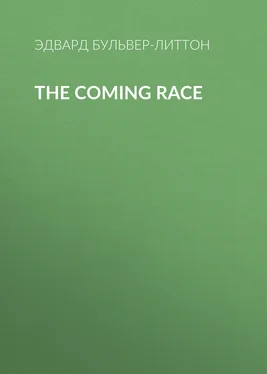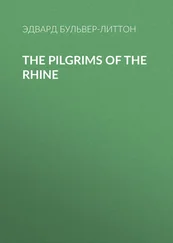Эдвард Бульвер-Литтон - The Coming Race
Здесь есть возможность читать онлайн «Эдвард Бульвер-Литтон - The Coming Race» — ознакомительный отрывок электронной книги совершенно бесплатно, а после прочтения отрывка купить полную версию. В некоторых случаях можно слушать аудио, скачать через торрент в формате fb2 и присутствует краткое содержание. Жанр: foreign_prose, literature_19, Европейская старинная литература, foreign_antique, на английском языке. Описание произведения, (предисловие) а так же отзывы посетителей доступны на портале библиотеки ЛибКат.
- Название:The Coming Race
- Автор:
- Жанр:
- Год:неизвестен
- ISBN:нет данных
- Рейтинг книги:3 / 5. Голосов: 1
-
Избранное:Добавить в избранное
- Отзывы:
-
Ваша оценка:
- 60
- 1
- 2
- 3
- 4
- 5
The Coming Race: краткое содержание, описание и аннотация
Предлагаем к чтению аннотацию, описание, краткое содержание или предисловие (зависит от того, что написал сам автор книги «The Coming Race»). Если вы не нашли необходимую информацию о книге — напишите в комментариях, мы постараемся отыскать её.
The Coming Race — читать онлайн ознакомительный отрывок
Ниже представлен текст книги, разбитый по страницам. Система сохранения места последней прочитанной страницы, позволяет с удобством читать онлайн бесплатно книгу «The Coming Race», без необходимости каждый раз заново искать на чём Вы остановились. Поставьте закладку, и сможете в любой момент перейти на страницу, на которой закончили чтение.
Интервал:
Закладка:
We were almost silent in our work. We toiled like men afraid to speak to each other. One end of the rope being thus apparently made firm to the ledge, the other, to which we fastened a fragment of the rock, rested on the ground below, a distance of some fifty feet. I was a younger man and a more active man than my companion, and having served on board ship in my boyhood, this mode of transit was more familiar to me than to him. In a whisper I claimed the precedence, so that when I gained the ground I might serve to hold the rope more steady for his descent. I got safely to the ground beneath, and the engineer now began to lower himself. But he had scarcely accomplished ten feet of the descent, when the fastenings, which we had fancied so secure, gave way, or rather the rock itself proved treacherous and crumbled beneath the strain; and the unhappy man was precipitated to the bottom, falling just at my feet, and bringing down with his fall splinters of the rock, one of which, fortunately but a small one, struck and for the time stunned me. When I recovered my senses I saw my companion an inanimate mass beside me, life utterly extinct. While I was bending over his corpse in grief and horror, I heard close at hand a strange sound between a snort and a hiss; and turning instinctively to the quarter from which it came, I saw emerging from a dark fissure in the rock a vast and terrible head, with open jaws and dull, ghastly, hungry eyes—the head of a monstrous reptile resembling that of the crocodile or alligator, but infinitely larger than the largest creature of that kind I had ever beheld in my travels. I started to my feet and fled down the valley at my utmost speed. I stopped at last, ashamed of my panic and my flight, and returned to the spot on which I had left the body of my friend. It was gone; doubtless the monster had already drawn it into its den and devoured it. The rope and the grappling-hooks still lay where they had fallen, but they afforded me no chance of return; it was impossible to re-attach them to the rock above, and the sides of the rock were too sheer and smooth for human steps to clamber. I was alone in this strange world, amidst the bowels of the earth.
Chapter III
Slowly and cautiously I went my solitary way down the lamplit road and towards the large building I have described. The road itself seemed like a great Alpine pass, skirting rocky mountains of which the one through whose chasm I had descended formed a link. Deep below to the left lay a vast valley, which presented to my astonished eye the unmistakeable evidences of art and culture. There were fields covered with a strange vegetation, similar to none I have seen above the earth; the colour of it not green, but rather of a dull and leaden hue or of a golden red.
There were lakes and rivulets which seemed to have been curved into artificial banks; some of pure water, others that shone like pools of naphtha. At my right hand, ravines and defiles opened amidst the rocks, with passes between, evidently constructed by art, and bordered by trees resembling, for the most part, gigantic ferns, with exquisite varieties of feathery foliage, and stems like those of the palm-tree. Others were more like the cane-plant, but taller, bearing large clusters of flowers. Others, again, had the form of enormous fungi, with short thick stems supporting a wide dome-like roof, from which either rose or drooped long slender branches. The whole scene behind, before, and beside me far as the eye could reach, was brilliant with innumerable lamps. The world without a sun was bright and warm as an Italian landscape at noon, but the air less oppressive, the heat softer. Nor was the scene before me void of signs of habitation. I could distinguish at a distance, whether on the banks of the lake or rivulet, or half-way upon eminences, embedded amidst the vegetation, buildings that must surely be the homes of men. I could even discover, though far off, forms that appeared to me human moving amidst the landscape. As I paused to gaze, I saw to the right, gliding quickly through the air, what appeared a small boat, impelled by sails shaped like wings. It soon passed out of sight, descending amidst the shades of a forest. Right above me there was no sky, but only a cavernous roof. This roof grew higher and higher at the distance of the landscapes beyond, till it became imperceptible, as an atmosphere of haze formed itself beneath.
Continuing my walk, I started,—from a bush that resembled a great tangle of sea-weeds, interspersed with fern-like shrubs and plants of large leafage shaped like that of the aloe or prickly-pear,—a curious animal about the size and shape of a deer. But as, after bounding away a few paces, it turned round and gazed at me inquisitively, I perceived that it was not like any species of deer now extant above the earth, but it brought instantly to my recollection a plaster cast I had seen in some museum of a variety of the elk stag, said to have existed before the Deluge. The creature seemed tame enough, and, after inspecting me a moment or two, began to graze on the singular herbiage around undismayed and careless.
Chapter IV
I now came in full sight of the building. Yes, it had been made by hands, and hollowed partly out of a great rock. I should have supposed it at the first glance to have been of the earliest form of Egyptian architecture. It was fronted by huge columns, tapering upward from massive plinths, and with capitals that, as I came nearer, I perceived to be more ornamental and more fantastically graceful that Egyptian architecture allows. As the Corinthian capital mimics the leaf of the acanthus, so the capitals of these columns imitated the foliage of the vegetation neighbouring them, some aloe-like, some fern-like. And now there came out of this building a form—human;—was it human? It stood on the broad way and looked around, beheld me and approached. It came within a few yards of me, and at the sight and presence of it an indescribable awe and tremor seized me, rooting my feet to the ground. It reminded me of symbolical images of Genius or Demon that are seen on Etruscan vases or limned on the walls of Eastern sepulchres—images that borrow the outlines of man, and are yet of another race. It was tall, not gigantic, but tall as the tallest man below the height of giants.
Its chief covering seemed to me to be composed of large wings folded over its breast and reaching to its knees; the rest of its attire was composed of an under tunic and leggings of some thin fibrous material. It wore on its head a kind of tiara that shone with jewels, and carried in its right hand a slender staff of bright metal like polished steel. But the face! it was that which inspired my awe and my terror. It was the face of man, but yet of a type of man distinct from our known extant races. The nearest approach to it in outline and expression is the face of the sculptured sphinx—so regular in its calm, intellectual, mysterious beauty. Its colour was peculiar, more like that of the red man than any other variety of our species, and yet different from it—a richer and a softer hue, with large black eyes, deep and brilliant, and brows arched as a semicircle. The face was beardless; but a nameless something in the aspect, tranquil though the expression, and beauteous though the features, roused that instinct of danger which the sight of a tiger or serpent arouses. I felt that this manlike image was endowed with forces inimical to man. As it drew near, a cold shudder came over me. I fell on my knees and covered my face with my hands.
Chapter V
A voice accosted me—a very quiet and very musical key of voice—in a language of which I could not understand a word, but it served to dispel my fear. I uncovered my face and looked up. The stranger (I could scarcely bring myself to call him man) surveyed me with an eye that seemed to read to the very depths of my heart. He then placed his left hand on my forehead, and with the staff in his right, gently touched my shoulder. The effect of this double contact was magical. In place of my former terror there passed into me a sense of contentment, of joy, of confidence in myself and in the being before me. I rose and spoke in my own language. He listened to me with apparent attention, but with a slight surprise in his looks; and shook his head, as if to signify that I was not understood. He then took me by the hand and led me in silence to the building. The entrance was open—indeed there was no door to it. We entered an immense hall, lighted by the same kind of lustre as in the scene without, but diffusing a fragrant odour. The floor was in large tesselated blocks of precious metals, and partly covered with a sort of matlike carpeting. A strain of low music, above and around, undulated as if from invisible instruments, seeming to belong naturally to the place, just as the sound of murmuring waters belongs to a rocky landscape, or the warble of birds to vernal groves.
Читать дальшеИнтервал:
Закладка:
Похожие книги на «The Coming Race»
Представляем Вашему вниманию похожие книги на «The Coming Race» списком для выбора. Мы отобрали схожую по названию и смыслу литературу в надежде предоставить читателям больше вариантов отыскать новые, интересные, ещё непрочитанные произведения.
Обсуждение, отзывы о книге «The Coming Race» и просто собственные мнения читателей. Оставьте ваши комментарии, напишите, что Вы думаете о произведении, его смысле или главных героях. Укажите что конкретно понравилось, а что нет, и почему Вы так считаете.












